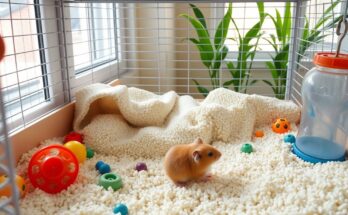For pet enthusiasts and hamster lovers, understanding the lifespan of Syrian hamsters is crucial for providing the best care. Let’s explore how long these adorable creatures typically live in a cage, and how you can ensure they have a long, happy life.
Introduction to Syrian Hamsters
Syrian hamsters, often known as golden or teddy bear hamsters, are one of the most popular pet choices for families and individuals alike. Their charming personalities and manageable size make them ideal pets. But how long do Syrian hamsters live in a cage? This question is central to ensuring we provide the best care for these small creatures.
The Natural Lifespan of Syrian Hamsters
In the wild, Syrian hamsters have a significantly shorter lifespan due to predators and environmental challenges. However, when kept as pets, their life expectancy can extend considerably. Typically, Syrian hamsters live for about 2 to 3 years in a cage, with some exceptional individuals reaching up to 4 years with optimal care.
Factors Affecting Lifespan
Several factors influence how long Syrian hamsters live in a cage. Understanding these can help pet owners optimize their hamster’s environment and care routine.
Genetics and Breed Characteristics
Genetics play a pivotal role in determining the lifespan of Syrian hamsters. Like all living creatures, hamsters inherit traits from their parents, which can include longevity. Reputable breeders focus on healthy lineage, enhancing the chances of a longer lifespan for their hamsters.
Diet and Nutrition
A balanced diet is crucial for the health and longevity of Syrian hamsters. Their diet should include a mix of commercial hamster pellets, fresh vegetables, fruits, and occasional protein sources like boiled eggs or mealworms. Avoid sugary and fatty foods to prevent obesity and diabetes, which can shorten their lifespan.
Components of a Healthy Diet
- Commercial Hamster Pellets: These provide a balanced nutritional base.
- Fresh Vegetables and Fruits: Carrots, broccoli, apples (without seeds), and berries are excellent choices.
- Proteins: Occasional treats like boiled eggs, mealworms, and small amounts of chicken.
- Water: Fresh, clean water should be available at all times.
Quality of Housing
The quality and type of housing significantly impact how long Syrian hamsters live in a cage. A spacious cage with plenty of room for exercise and enrichment activities can contribute to a longer, healthier life. The cage should be well-ventilated and secure to prevent escape and injuries.
Ideal Cage Features
- Size: Minimum dimensions of 24 inches by 12 inches by 12 inches.
- Ventilation: Adequate airflow to prevent respiratory issues.
- Security: Sturdy locks and escape-proof design.
- Accessories: Wheels, tunnels, and climbing structures for physical and mental stimulation.
Exercise and Mental Stimulation
Regular exercise is vital for Syrian hamsters. Providing a wheel, tunnels, and toys encourages physical activity, which helps maintain a healthy weight and prevents boredom. Mental stimulation is equally important; puzzles and interaction with their owners can keep their minds sharp.
Types of Exercise Equipment
- Hamster Wheels: Ensure the wheel is solid and appropriately sized to avoid spine issues.
- Tunnels and Tubes: Create an intricate network for exploration.
- Chew Toys: Essential for dental health and mental stimulation.
- Puzzle Toys: Engaging toys that require problem-solving skills.
Veterinary Care and Health Monitoring
Regular veterinary check-ups can catch health issues early, ensuring prompt treatment and a better prognosis. Common ailments in Syrian hamsters include dental problems, respiratory infections, and tumors. Being vigilant and seeking veterinary care when needed can extend their lifespan.
Common Veterinary Treatments
- Dental Care: Regular trimming of overgrown teeth.
- Antibiotics: For bacterial infections like respiratory issues.
- Surgery: In cases of tumors or abscesses.
- Preventive Care: Routine health checks to monitor overall health.
Environmental Conditions
Maintaining an appropriate temperature and humidity level is essential for Syrian hamsters. Extreme temperatures can cause stress and health issues. Keeping their cage in a stable, draft-free environment can prevent illnesses and promote longevity.
Optimal Environmental Conditions
- Temperature: Maintain between 65-75°F (18-24°C).
- Humidity: Keep humidity levels moderate, around 40-60%.
- Lighting: Provide a natural day-night cycle to regulate their biological rhythms.
- Noise Levels: Minimize loud noises to reduce stress.
Social Interaction and Handling
While Syrian hamsters are solitary animals and should be housed alone, regular gentle handling and interaction with their human caretakers can positively affect their well-being. Social interaction helps in taming the hamster and reduces stress.
Best Practices for Handling
- Gentle Approach: Approach your hamster slowly to avoid startling them.
- Regular Interaction: Handle your hamster daily to build trust.
- Safe Handling: Support their body and avoid sudden movements.
- Observation: Watch for signs of stress and adjust handling accordingly.
Recognizing Signs of Aging in Syrian Hamsters
As Syrian hamsters age, their activity level may decrease, and they might show signs of aging such as greying fur, weight loss, or lethargy. Recognizing these signs helps in adjusting their care routine to ensure they remain comfortable in their twilight years.
Common Signs of Aging
- Reduced Activity: Less time spent on the wheel and exploring.
- Changes in Fur: Thinning or greying fur.
- Weight Changes: Gradual weight loss or gain.
- Lethargy: Increased sleeping and less interaction.
Common Health Issues and Lifespan Impact
Syrian hamsters are prone to certain health issues that can affect their lifespan. Understanding these common problems and their signs can help in managing and preventing them.
Respiratory Infections
Respiratory infections are common in hamsters and can be caused by poor ventilation, dusty bedding, or sudden temperature changes. Symptoms include sneezing, wheezing, and discharge from the nose or eyes. Prompt veterinary care is essential.
Wet Tail
Wet tail is a severe gastrointestinal disease common in hamsters, characterized by diarrhea and dehydration. It’s highly contagious and can be fatal if not treated quickly. Stress and unsanitary conditions are common causes.
Dental Issues
Hamsters’ teeth grow continuously, and without proper chewing material, they can develop dental problems. Providing chew toys and monitoring their teeth can prevent overgrowth and related issues.
Tumors and Cancer
Older hamsters are more prone to developing tumors and cancers. Regular health checks can help in early detection and management, although treatment options are limited for such small animals.
Tips for Enhancing the Lifespan of Syrian Hamsters
There are several practical steps pet owners can take to enhance the lifespan of their Syrian hamsters.
Choosing the Right Cage
Selecting a spacious, well-ventilated cage with secure latches is fundamental. A multi-level cage can provide more space for activity and enrichment, which is beneficial for the hamster’s health.
Providing a Balanced Diet
Ensure your hamster’s diet is varied and balanced. Fresh water should always be available, and food should be changed regularly to prevent spoilage. Avoid feeding them toxic foods like chocolate, caffeine, or onions.
Regular Cleaning and Maintenance
Clean the cage regularly to prevent the buildup of waste and bacteria. A clean environment reduces the risk of infections and promotes a healthier living space for your hamster.
Interactive Toys and Enrichment
Invest in a variety of toys and enrichment items to keep your hamster engaged and active. Rotate toys regularly to maintain their interest and provide new challenges.
Monitoring and Early Intervention
Be observant of any changes in your hamster’s behavior, appetite, or appearance. Early intervention can prevent minor issues from escalating into severe health problems.
Creating a Stress-Free Environment
Minimize stress by maintaining a consistent routine and avoiding sudden changes in their environment. Handle your hamster gently and provide hiding spots within the cage where they can retreat and feel safe.
Breeding Considerations
If considering breeding Syrian hamsters, ensure it’s done responsibly and with the health of the animals in mind. Overbreeding or breeding hamsters with known genetic issues can reduce the lifespan of future generations.
FAQs about Syrian Hamster Lifespan
1. How long do Syrian hamsters live in a cage?
Syrian hamsters typically live 2 to 3 years in a cage, with some reaching up to 4 years with optimal care.
2. What factors affect the lifespan of Syrian hamsters?
Factors include genetics, diet, housing quality, exercise, veterinary care, and environmental conditions.
3. Can Syrian hamsters live longer with better care?
Yes, providing a balanced diet, a spacious and clean cage, regular exercise, and prompt veterinary care can extend their lifespan.
4. What are common health issues in Syrian hamsters?
Common issues include respiratory infections, wet tail, dental problems, and tumors.
5. How can I prevent health problems in my Syrian hamster?
Regular cage cleaning, a balanced diet, providing chew toys, and maintaining a stable environment can help prevent health problems.
6. Is it normal for Syrian hamsters to slow down as they age?
Yes, reduced activity and signs of aging like greying fur and weight loss are normal as hamsters get older.
7. What should I do if my hamster shows signs of illness?
Seek veterinary care promptly if your hamster shows symptoms like lethargy, loss of appetite, or respiratory distress.
8. Can Syrian hamsters live with other hamsters?
No, Syrian hamsters are solitary animals and should be housed alone to prevent fighting and stress.
Conclusion
Understanding how long Syrian hamsters live in a cage and the factors that influence their lifespan is key to providing the best care. With proper attention to their diet, housing, and health needs, these delightful pets can live a full and healthy life. By being proactive and observant, pet owners can ensure their Syrian hamsters thrive and enjoy their time as beloved companions.


